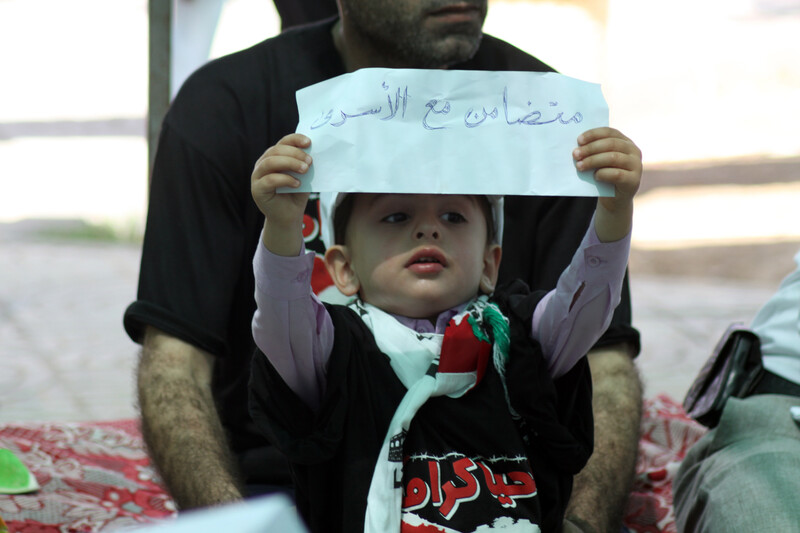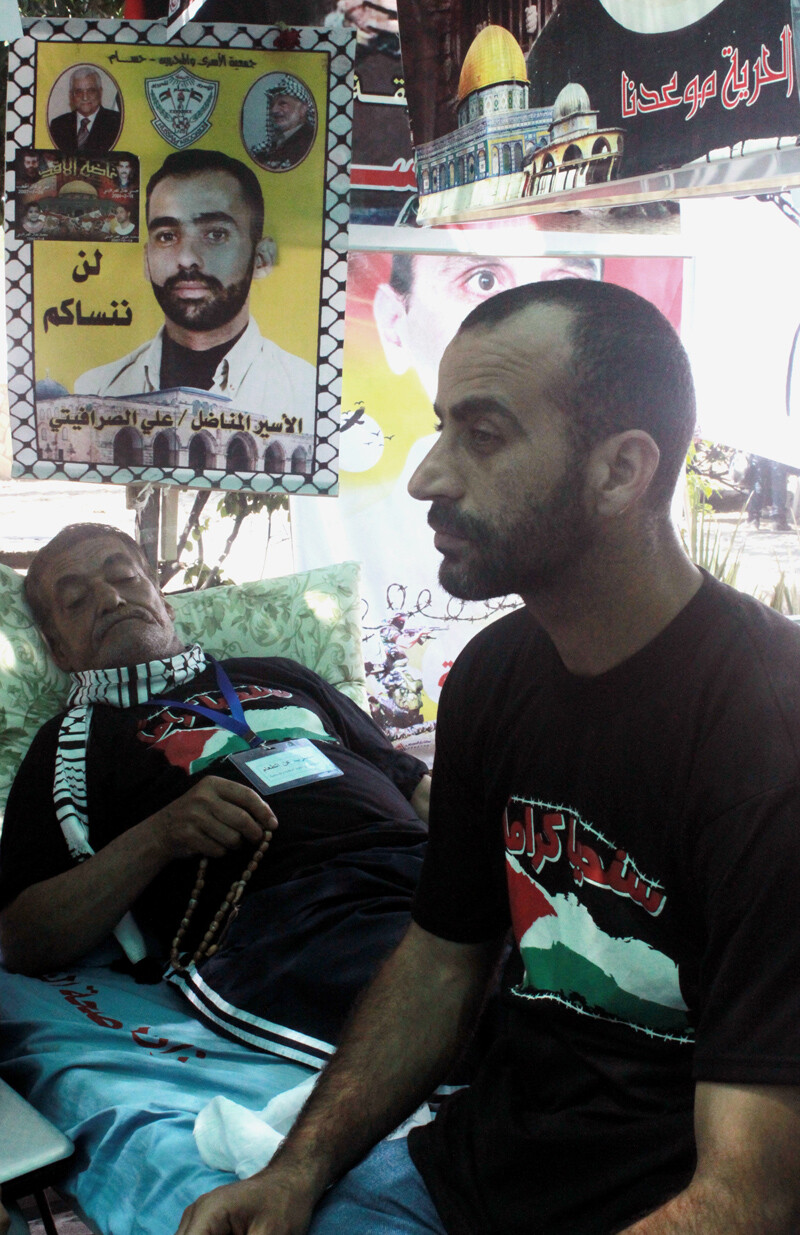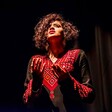10 May 2012

The son of a hunger striker holds a sign reading “I am in solidarity with Palestinian detainees.”
The sit-in tent for Palestinian political prisoners has been moved from the International Committee for the Red Cross to a central park near the statue of the Unknown Soldier in the middle of Gaza City. It is one of the few green places and thus one of the most lively places in Gaza, where people escape from their dark houses and seek fun and relief, or to simply people watch.
However, the sit-in tent is intended to send messages of solidarity with our political prisoners who have been on a mass hunger strike since April 17, and to show anger with the Arab and international community and all human rights organizations, which keep calling for human rights, democracy and justice, but when it comes to our prisoners, they do nothing but watch them die.
The solidarity is taking many forms, such as lighting candles, marches, as well as creatively performing plays, songs, poetry and dabka dance. In Gaza’s sit-in tent, 50 men and 45 women have staged a symbolic hunger strike in solidarity with the detainees since May 2, including prisoners’ wives, parents and sisters, as well as former prisoners. Protesting day and night, the tent is their shelter as long as the revolution of hunger is going inside Israeli prisons.
Health deteriorating
Having been in the solidarity tent daily, even more than in my house, I’ve witnessed most of the cases among hunger strikers whose health conditions has begun to deteriorate. Several cases were sent to hospital for low or high blood pressure and so many people have fainted or emotionally collapsed. Ambulances and doctors never leave the tents anymore as if they have full time job at the tent.
While observing the hunger strikers getting paler as more days pass, I can’t help but think of our heroes, our prisoners behind Israel’s bars, and compare. The strikers here in Gaza City have access to water and salt and they also have a small dish of yogurt and soup per day. But our prisoners have nothing but water and salt, and sometimes not even that if it has been confiscated by the Israeli prison authorities. Strikers here can rest or sleep whenever they feel like it, but our prisoners keep getting transferred between sections and prisons by the Israeli Prison Services in an attempt to exhaust them.
Loai Odeh, a former prisoner who is also now on solidarity hunger strike, emphasizes that the IPS mercilessly prevents the strikers from resting. Recalling his experience during last September’s hunger strike during the campaign of disobedience in Israeli prisons, he wrote: “Soldiers burst into strikers’ rooms aggressively as if they were confronting armed fighters on a battleground, not hunger strikers with feeble bodies that can barely stand. Knowing that strikers are intolerant of noise, soldiers break into their rooms with loud screams and initiate a hand search in a way that one feels that he’s being beaten rather than searched.”
“Only son left”

Hosny al-Srafiti and Loai Odeh at the sit-in tent.
While making the daily tour to show support and admiration to the hunger strikers in the tent, I was surprised to see Abu Hosny al-Srafity wearing the strikers’ t-shirt that distinguishes them from others, beautifully designed with the Palestinian flag and “we’ll live dignified” written on it. Abu Hosny, 66-year old, is a detainee’s father who I met since I started going to the weekly protest in at the International Committee of the Red Cross for political prisoners.
Whenever we meet, we greet each other and have a short and informal conversation, but never had a real one that would make me feel like knowing him intimately. That changed after I said “You, too?” out of surprise, reacting to seeing that t-shirt.
“Absolutely!” he asserted. “We took this step because we consider ourselves as partners in this battle of dignity but our hunger strike remains symbolic at the end of the day. It equals nothing to our detainees’ enormous suffering under the Israeli oppressive regime. They aren’t only hungry for food, they are hungry for dignity, justice and freedom.”
He refused to let his age be a barrier in front of standing with his son Ali who was detained for ten years and still has six to go. Doctors keep pressuring him to break his hunger strike but he refuses, saying that “my life isn’t any more precious than that of my son.”
Our conversation was still in the beginning. What came next was heartbreaking. I was amazed at his high spirit and his determination but this profound chat we had clarified to me where he got that strength from.
“Ali is the only son left,” he said.
“Left?” I interrupted.
Then he moved his elbow to reveal a photo he kept tucked under his arm and started explaining, “I had three sons. My oldest son Hosny and my youngest Mohammed were killed and the one in the middle is behind Israel’s bars.”
I felt enraged and asked how his sons were killed.
“In 2004, I was sitting with my wife chatting alone about the terrifying sounds of warplanes that occupied Gaza’s sky. We knew an attack was coming. Then a loud expulsion was heard and shook the land below us. We were in indescribable panic. My wife prayed, ‘May God stand with the mothers of the targeted people,’ Then she answered the phone that informed her about the assassination of her oldest son, having no idea she was praying for herself.”
It was very hard to keep control of my emotions after hearing that tragedy. I continued looking directly at his eyes that were full of sorrow and listened silently.
“Wait. The next story is even more shocking,” he said. “I was on my way home from a family visit with my wife and my seven-year-old son Mohammed in 1994. We were close to the eastern line, near Nahal Oz settlement. While standing in the street and waving for cars to take us back home, we suddenly glanced an Israeli car and a jeep driving very fast toward us. We got confused and scared. They intentionally smashed my son under their wheels, hit my wife and badly injured her and kept driving fast toward the settlement. It was horrible. It all happened so quickly that I couldn’t rescue my son who froze out of fear in front of that heartless driver who killed him and didn’t bother to even look back.”
Abu Hosny stopped talking to see my reaction but I was too shocked to say anything. His voice narrating the stories of the murders of his two sons kept replaying in my ears, and my tears kept flowing and the features of shock didn’t leave my face. He saw me in that condition and softly tapped on my hand and said, “Don’t be sad, my daughter. As long as we’re living on these holy lands of Palestine, we’ll never get fed up giving any sacrifice. These unjust and unsecure lives we’re leading are the source of our inner strength and determination. If that wasn’t the case, you wouldn’t see me now hunger striking in solidarity with my son, the living martyr, hoping to celebrate his freedom soon.”
Let’s pray that all detainees’ families may celebrate the victory of their detained sons in their battle of empty stomachs against the armed merciless jailers. Let’s support our prayers by taking serious actions.






Comments
Palestine strikers
Permalink Jamie Atari replied on
SubhanAllah, Shahd. dear sister.. I pray for you and all these wonderful Palestinians. It breaks my heart to hear stories.. My sister in law is in Jerusalem with her family. She is a widow after her husband died as a casualty of war. But she wont leave.. Palestine is her country and her home.
thanks for sharing all this insight with everyone about the Palestinians. People need to know..